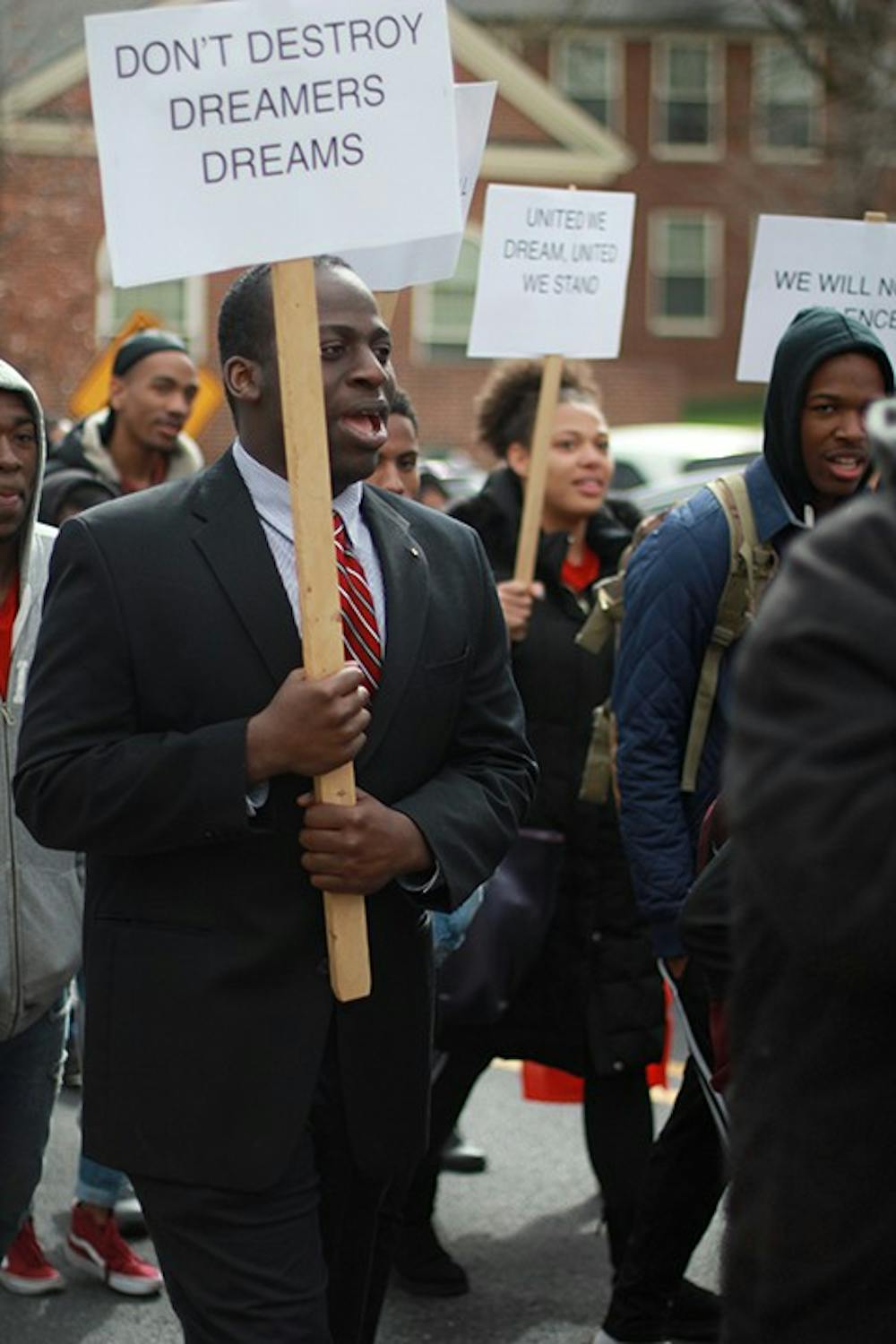The voices of Shippensburg University students and faculty echoed across campus Thursday afternoon as the Latino Student Organization (LSO) lead its eighth annual Pa’lante march around campus.
Before the start of the march, students and faculty met in Gilbert Hall to talk about Deferred Action for Childhood Arrivals (DACA) and discuss why they march.
“There are people that cannot (march), that are afraid to do it because they think that if they come to the forefront they will be singled out or somebody is going to tell on them,” said modern languages professor Jose Ricardo-Osorio. “So they prefer to stay in the shadows.”
Next, Kapri Brown, assistant director of Multicultural Affairs, stepped onto the small stage in the backroom of Gilbert Hall to explain why she planned to march.
“Sometimes we have this entitlement attitude like ‘I’m not worried about it’ or ‘it doesn’t affect me’ ‘they’re not coming for me,’ but one day somebody will come for you,” Brown said as she stood in front of a large white banner with black letters on it which read “T-I-O-H,” an acronym for “This is our hour.”
“Somebody will come for you,” Brown added, “and it may not mean they’re coming for everybody else. You have to remember that you have an obligation to speak up and speak out. That’s why I march.”
After Brown’s words to the crowd, Adanjesús Marín, the director of Make the Road PA (MRPA), took the stage. According to MRPA’s official Facebook page, the organization “builds the power of Latino and working-class communities to achieve dignity and justice through organizing, policy innovation, transformative education and survival services.”
“There is a lot for us to be angry about,” Marín said. “What we are marching for today is connected to so many other struggles that we are marching and fighting for.”
Marín explained that he believes the current government administration uses fear to keep people from speaking up for themselves, but that they cannot stay quiet on this issue.
“There is not a single thing that this administration is doing right now for our good,” Marín said. “This isn’t new, what’s new is the level of shamelessness they have about their aspirations.”
“We have to understand, that if we’re going to win, that today we have to march for Dreamers,” he said. Dreamers are DACA recipients.
Before the start of the march, Marín invited the crowd to join him in a pledge. Everyone in the room stood up with their right fist raised and repeated after Marín: “It is our duty to fight for freedom, it is our duty to win, we must love each other and support each other, we have nothing to lose but our chains.”
Students picked up signs placed in the front of the room, which stated things like “Don’t destroy Dreamers’ dreams” and “education not deportation.” There were signs in both English and Spanish. Before stepping out to begin the march, the students holding the signs began to chant them until the entire room was echoing back the chants.
“Say it loud, say it clear!” someone chanted from the crowd, which had moved onto the lawn of Gilbert Hall, “immigrants are welcome here!” the crowd chanted back.

The group marched down Gilbert Drive before turning left onto Old Main Drive. The crowd held their signs high, which were rustled by the strong winds of a cloudy day, as campus police escorted them across the intersection of Old Main Drive and Prince Street chanting “Out of the shadows into the streets!”
When the group turned onto Dauphin Drive from Adam’s Drive, the sun began to show through the clouds as Marín bellowed out “No papers, no fear!” to which the marchers responded “Immigrants are welcome here!”
The march ended on the steps of the Ceddia Union Building (CUB) amphitheater, where the crowd chanted “Education not deportation!”
Students saw the march as a way to support others and speak up for a good cause.
“Me personally, as being an African-American female, I feel like it’s important to support anybody else, especially minorities, that face different struggles,” freshman Jessica Brown said, standing on the CUB amphitheater stairs.
“As a Latina here, it’s really important that we’re here and that we’re ready to speak up,” freshman Brenda Aristy said. “This was really empowering for all the Latinos to show that they’re not alone.”




The Slate welcomes thoughtful discussion on all of our stories, but please keep comments civil and on-topic. Read our full guidelines here.